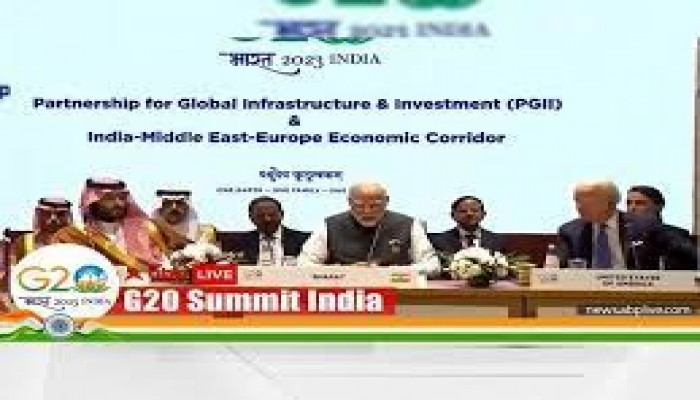India-Middle East- Europe Economic Corridor unveiled at G20 summit
- In Reports
- 07:28 PM, Sep 09, 2023
- Myind Staff
President Joe Biden and his allies have revealed ambitious plans to develop a rail and shipping corridor connecting India with the Middle East and Europe. This project aims to foster economic growth and political cooperation among nations.
“This is a big deal,” said Biden. “This is a really big deal.”
The proposed corridor holds the potential to enhance trade, facilitate energy resource transportation, and enhance digital connectivity. The nations involved in this project include India, Saudi Arabia, the United Arab Emirates, Jordan, Israel, and the European Union, as stated by Jake Sullivan, President Biden's national security adviser.
During the annual Group of 20 summit of the world's leading economies, President Biden, Indian Prime Minister Narendra Modi, and European Commission President Ursula von der Leyen unveiled the project, which is a component of the Partnership for Global Infrastructure Investment initiative.
“We think that the project itself is bold and transformative, but the vision behind the project is equally bold and transformative, and we will see it replicated in other parts of the world as well,” Sullivan said.
The rail and shipping corridor aims to enhance global connectivity, facilitate trade, and promote the exchange of energy resources, including hydrogen. The White House did not provide funding details or a completion timeline but highlighted its potential as an alternative to China's infrastructure program.
The initiative reflects President Biden's commitment to international collaboration and economic growth in the Middle East, aiming to transform the region into an economic hub.
The project began taking shape after Biden's visit to Jeddah in July 2022, emphasizing regional economic integration. Conversations with regional partners started in January, and by spring, assessments and maps of Middle East rail infrastructure were in progress.
Senior White House officials visited Saudi Arabia in May, and since then, all parties have worked on finalizing the agreement. Israel and Jordan were also brought into the project, with Israel's inclusion considered significant. The project is not seen as a precursor to normalization between Saudi Arabia and Israel.
“The participants in this effort are focused on practical outcomes that deliver for their people,” Sullivan said. “And a corridor of this kind by dint of geography works best having Israel in as opposed to out and the countries participating prioritized that.”
Biden discussed climate change and the impact of Russia's war in Ukraine at the G20 sessions. Ukraine President Zelenskyy, a regular summit participant, was not invited this year, despite White House efforts to include him. India, a key U.S. ally, has increased Russian oil purchases amid the conflict.
“Ultimately, it is not our decision,” Finer said. “But you can expect that the United States and our other partners who are working with Ukraine so closely ... We’ll make that case quite forcefully in the context of these conversations.”
The G20 summit's joint statement addressed the war, affirmed principles against using force to change borders, rejected nuclear weapons, and called for a just peace. Biden also discussed funding for the World Bank, aiming to strengthen the G20 as an international forum, even as Xi Jinping and Vladimir Putin were absent.
Biden has said he’s disappointed by Xi’s decision. Asked again about the Chinese leader’s absence, but said the summit “is going well” though “it would be nice to have him here.”
Image source: ET







Comments